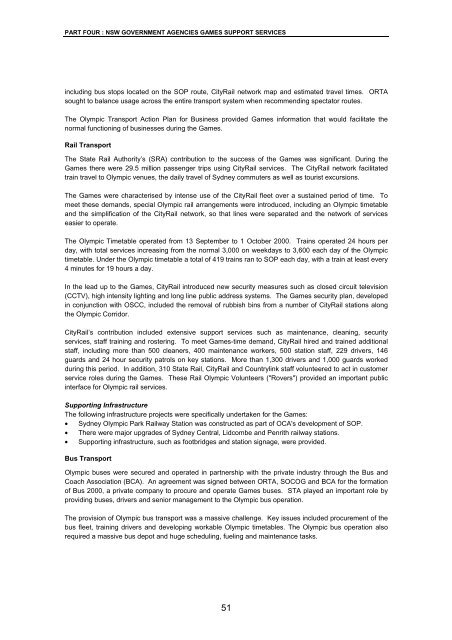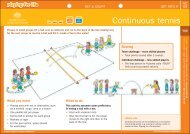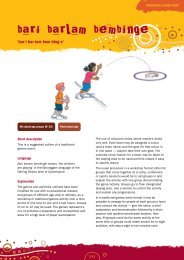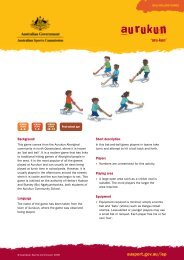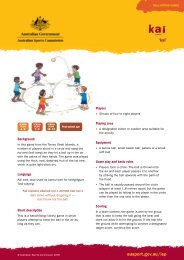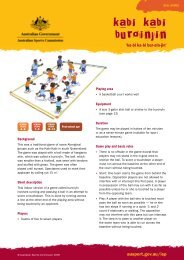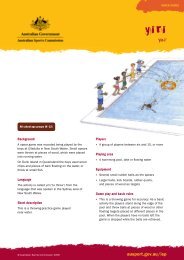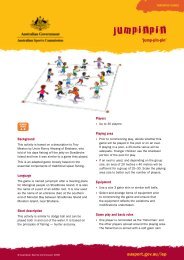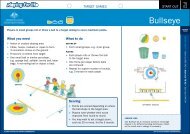the sydney 2000 olympic and paralympic games - Australian Sports ...
the sydney 2000 olympic and paralympic games - Australian Sports ...
the sydney 2000 olympic and paralympic games - Australian Sports ...
Create successful ePaper yourself
Turn your PDF publications into a flip-book with our unique Google optimized e-Paper software.
PART FOUR : NSW GOVERNMENT AGENCIES GAMES SUPPORT SERVICES<br />
including bus stops located on <strong>the</strong> SOP route, CityRail network map <strong>and</strong> estimated travel times. ORTA<br />
sought to balance usage across <strong>the</strong> entire transport system when recommending spectator routes.<br />
The Olympic Transport Action Plan for Business provided Games information that would facilitate <strong>the</strong><br />
normal functioning of businesses during <strong>the</strong> Games.<br />
Rail Transport<br />
The State Rail Authority’s (SRA) contribution to <strong>the</strong> success of <strong>the</strong> Games was significant. During <strong>the</strong><br />
Games <strong>the</strong>re were 29.5 million passenger trips using CityRail services. The CityRail network facilitated<br />
train travel to Olympic venues, <strong>the</strong> daily travel of Sydney commuters as well as tourist excursions.<br />
The Games were characterised by intense use of <strong>the</strong> CityRail fleet over a sustained period of time. To<br />
meet <strong>the</strong>se dem<strong>and</strong>s, special Olympic rail arrangements were introduced, including an Olympic timetable<br />
<strong>and</strong> <strong>the</strong> simplification of <strong>the</strong> CityRail network, so that lines were separated <strong>and</strong> <strong>the</strong> network of services<br />
easier to operate.<br />
The Olympic Timetable operated from 13 September to 1 October <strong>2000</strong>. Trains operated 24 hours per<br />
day, with total services increasing from <strong>the</strong> normal 3,000 on weekdays to 3,600 each day of <strong>the</strong> Olympic<br />
timetable. Under <strong>the</strong> Olympic timetable a total of 419 trains ran to SOP each day, with a train at least every<br />
4 minutes for 19 hours a day.<br />
In <strong>the</strong> lead up to <strong>the</strong> Games, CityRail introduced new security measures such as closed circuit television<br />
(CCTV), high intensity lighting <strong>and</strong> long line public address systems. The Games security plan, developed<br />
in conjunction with OSCC, included <strong>the</strong> removal of rubbish bins from a number of CityRail stations along<br />
<strong>the</strong> Olympic Corridor.<br />
CityRail’s contribution included extensive support services such as maintenance, cleaning, security<br />
services, staff training <strong>and</strong> rostering. To meet Games-time dem<strong>and</strong>, CityRail hired <strong>and</strong> trained additional<br />
staff, including more than 500 cleaners, 400 maintenance workers, 500 station staff, 229 drivers, 146<br />
guards <strong>and</strong> 24 hour security patrols on key stations. More than 1,300 drivers <strong>and</strong> 1,000 guards worked<br />
during this period. In addition, 310 State Rail, CityRail <strong>and</strong> Countrylink staff volunteered to act in customer<br />
service roles during <strong>the</strong> Games. These Rail Olympic Volunteers ("Rovers") provided an important public<br />
interface for Olympic rail services.<br />
Supporting Infrastructure<br />
The following infrastructure projects were specifically undertaken for <strong>the</strong> Games:<br />
• Sydney Olympic Park Railway Station was constructed as part of OCA's development of SOP.<br />
• There were major upgrades of Sydney Central, Lidcombe <strong>and</strong> Penrith railway stations.<br />
• Supporting infrastructure, such as footbridges <strong>and</strong> station signage, were provided.<br />
Bus Transport<br />
Olympic buses were secured <strong>and</strong> operated in partnership with <strong>the</strong> private industry through <strong>the</strong> Bus <strong>and</strong><br />
Coach Association (BCA). An agreement was signed between ORTA, SOCOG <strong>and</strong> BCA for <strong>the</strong> formation<br />
of Bus <strong>2000</strong>, a private company to procure <strong>and</strong> operate Games buses. STA played an important role by<br />
providing buses, drivers <strong>and</strong> senior management to <strong>the</strong> Olympic bus operation.<br />
The provision of Olympic bus transport was a massive challenge. Key issues included procurement of <strong>the</strong><br />
bus fleet, training drivers <strong>and</strong> developing workable Olympic timetables. The Olympic bus operation also<br />
required a massive bus depot <strong>and</strong> huge scheduling, fueling <strong>and</strong> maintenance tasks.<br />
51


